Past Events

- Market Square
Welcoming Pittsburgh and the Pittsburgh Downtown Partnership are teaming up to host World Square, a platform to celebrate, promote, and welcome our local international communities.
Friday, June 11 – Sunday, June 13, 2021
Market Square, Downtown Pittsburgh
Free admission
Hours
Friday, June 11: 5 – 10 p.m.
Saturday, June 12: 12 – 8 p.m.
Sunday, June 13: 12 – 6 p.m.
Across three days in June during the Dollar Bank Three Rivers Arts Festival, Market Square will become a showcase for businesses, artists, makers, performers, food purveyors, and more from across the various international and newcomer communities.
World Square is presented by Welcoming Pittsburgh and the Pittsburgh Downtown Partnership. For more information, visit the Pittsburgh Downtown Partnership website.
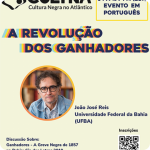
- João José Reis
- Zoom
O seminário "Culturas Negras no Atlantico (CULTNA)" é uma iniciativa que congrega o Laboratório de História Oral e Imagem (LABHOI) da Universidade Federal Fluminense e da Universidade Federal de Juiz de Fora, e o Center for Latin American Studies da University of Pittsburgh. Neste encontro, será discutido o livro Ganhadores (capítulos 3, 7, 8, 9, 10), de João José Reis, com o próprio autor. Evento em português. No Brasil, o livro está disponível para compra no site da editora: https://www.companhiadasletras.com.br/detalhe.php?codigo=14633

- Zoom
Names carry a lot of weight, including people's opinion of you before having the chance to meet you. We will explore unconscious bias and its impacts on different aspects of life ranging from social, professional, and academic spaces. Zoom link: https://pitt.zoom.us/j/92860659129 Learn more about the "What's in a Name?" series: https://www.globalhub.pitt.edu/programming/whats-in-a-name
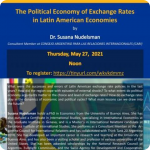
- Susana Nudelsman
- Zoom
In a globalized world, the exchange rate, while expressing the exchange ratio between the currency of a country and the rest of the world, is a key price that affects nominal and real aspects of the economies. The issue is particularly complex in the developing economies that are subject to both the challenges of their internal variables and those of external financing cycles and commodity price fluctuations. Moreover, in the globalization process, prolonged misalignments in exchange rates have been associated with severe financial crises. No less is the impact of the exchange rate on the rate of inflation in these economies.
The presentation will focus on both economic as well as political economy arguments of exchange rate policies. While the traditional approach is typically dominated by the analysis of only economic factors, the more recent political economy point of view includes the behavior of different players involved in the political game. In this regard, exchange rate policies can be understood in terms of the distributional and electoral motivations that determine the regional policymaking. This approach highlights the need for considering the impact of interests, interactions, and institutions in the analysis of the topic.
In this context, the presentation will examine the role of the exchange rates in Latin America’s economy in the current global era. It aims to respond to several questions:
▪ Why should we care about the political economy of exchange rates in Latin America?
▪ What were the successes and errors of exchange rate policies in Latin America in the last years?
▪ How did the region cope with past episodes of external shocks, and particularly with the 2008 global financial crisis?
▪ What is the relevance of exchange rates in the dynamics of economic and political cycles?
▪ What main lessons can we draw for the future?
Susana Nudelsman holds a PhD in Economics from the University of Buenos Aires. She has also pursued a Certificate in International Studies, specializing in International Economics at the Graduate Institute in Geneva, and is a Master’s in International Relations candidate at Barcelona Institute of International Studies. She performs as a Consultant Member at the Argentine Council for International Relations and has collaborated with Think Tank 20 Argentina 2018. She has developed an important career in research and teaching at the University of Buenos Aires and has also been a visiting scholar and professor in various universities of the United States. She has been awarded scholarships by the National Research Council of Argentina, Fulbright Commission, and the Swiss Agency for Development and Cooperation. She has published articles focused on Latin American issues and served as a reviewer for Economics journals.

- Zoom
What are microaggressions? How do microaggressions associated with names affect marginalized groups, and what can we do to ensure that everyone feels respected, supported, and included in our communities? In this workshop, we will discuss how to identify microaggressions and provide tools for how to address them in the context of name pronunciation.
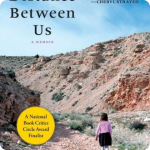
- Virtual - Register Online!
This reading group for educators explores literary texts from a global perspective. Content specialists present the work and its context, and together we brainstorm innovative pedagogical practices for incorporating the text and its themes into the curriculum. Sessions this year will take place virtually on Thursday evenings from 5-7:30 PM. Books and Act 48 credit are provided.

- Manuel Roman Lacayo
- Zoom
Can names create subconscious bias? What is the history of our given name? Does the region where our name is most popular impact how we are perceived? How do social status and laws affect our name? Why is it so challenging to ask someone how their name is pronounced? This series aims to open a doorway to explore issues that affect us every day, and that, ultimately, reverberate through the most intimate aspects of who we are. While we will explore basic tools and name etiquette, with the kindness and respect we all deserve, we intend to reflect about what our names say about us, and how they may be used to define who we are. Please join our exploration of a crucial topic seldom discussed.
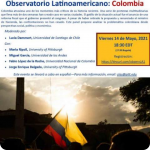
- Lucia Dammert, Marla Ripoll, Miguel Garcia, Fabio López de la Roche, Jorge Enrique Delgado
- Zoom
Colombia atraviesa uno de los momentos más críticos de su historia reciente. Una serie de protestas multitudinariasque lleva más de dos semanas han creado caos en varias ciudades. El gatillo de la situación actual fue el anuncio de una reforma fiscal que el gobierno presentó al congreso. A pesar de haber retirado la propuesta y renunciado el ministro de Hacienda, las confrontaciones no han cesado. Este panel propone analizar la problemática colombiana desde perspectivas social, política y económica.
Moderado por: Lucia Dammert (Universidad de Santiago de Chile)
Con:
Marla Ripoll (University of Pittsburgh)
Miguel García (Universidad de los Andes)
Fabio López de la Roche (Universidad Nacional de Colombia)
Jorge Enrique Delgado (University of Pittsburgh)
The event will be in Spanish. // El evento será en español.
Poster Image credit: Leon Hernandez
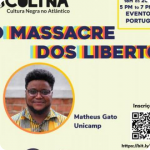
- Matheus Gato
- Zoom
O seminário "Culturas Negras no Atlantico (CULTNA)" é uma iniciativa que congrega o Laboratório de História Oral e Imagem (LABHOI) da Universidade Federal Fluminense e da Universidade Federal de Juiz de Fora, e o Center for Latin American Studies da University of Pittsburgh. Neste encontro, será discutido o livro Massacre dos Libertos, de Matheus Gato (editora Perspectiva). com o próprio autor. Evento em português. No Brasil, o livro está disponível para compra no site da editora: https://editoraperspectiva.com.br/produtos/massacre-dos-libertos-o/
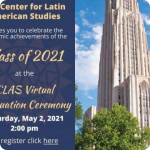
- Zoom
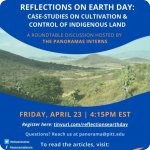
- Panoramas Interns
- Zoom
As a celebration of Earth Day and some of the planet's most vehement protectors, join the Panoramas interns in a presentation of case-studies of Indigenous peoples' relationship with the lands they inhabit. Starting with Prehispanic Latin America with Indigenous agricultural practices, and the impact of early globalization, the presenters frame centuries of land abuse and impact of colonization on aboriginal including: Industrialized agriculture and economic growth pose a serious threat to sustainable practices at The Cerrado, a vast and relatively unknown Savannah in Central Brazil being decimated at a rate roughly four-times faster than the Amazon deforestation. The beef industry is responsible for most of the deforestation as well as the murder and displacement of thousands of Indigenous people In the Amazon, raising serious concerns about its long-term sustainability. Climate change in Latin America impacts Indigenous peoples’ spiritual connection to land, leading to worse mental health outcomes among their communities. The Mapuche, an Indigenous group that live in Argentina and Chile, have been fighting for autonomy since the invasion of the Spanish to the Americas. Afro-Indigenous populations, such as the Garifuna, play a pivotal role in sustainability in Latin America as their respect for the land they inhabit is integrated into their cultural practices. By challenging western ideas and exploring past and current confrontations between people fighting for their land, we are faced with questions about our role.

- Katie Lloyd and Luke Morales
- Zoom
The Columbian Exchange is categorized as the movement of life in both directions across the Atlantic—from Eurasia and Africa to the Americas and vice versa. Whether discussing horses in the Americas or chili peppers in Asia, introductions to new flora and fauna during the 15th and 16th centuries on these continents gave way to drastic changes in environment, resulting in changes in ways of life. How did these lifestyle changes translate to agriculture and food culture?

- Zoom
We will be discussing the JAMA "no doctor is racist" issue. As you probably heard, in February JAMA published a podcast to discuss structural racism. The host made "strange" assertions. Sarah Sanders will guide us in a discussion of an article that talks about this, but please feel free to get more info on the topic. How Whiteness Works: JAMA and the Refusals of White Supremacy, by Clarence, c. Gravlee, Somatosphere, March 27, 2021. http://somatosphere.net/2021/how-whiteness-works.html/ With the support of the Center for Latin American Studies, we explore 1) the problems Latinos in small yet rapidly growing populations face, and 2) how to solve those problems. We hope to get new writing and research collaborations going! Open to all interested: students, faculty, staff, and practitioners from Pitt and beyond. If you want to get extra network time, we will be there 30 minutes before and after the meeting times. Meeting Passcode: Philadelphia
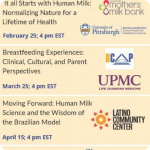
- Zoom
Join the Nationality Rooms Program and Mid-Atlantic Mother's Milk Bank for a series of panel discussions on the health and cultural aspects of Human Milk. Also sponsored by CLAS, African Studies, the School of Health and Rehab Sciences, UPMC, the Latino Community Center, and the Bhutanese Community Association of Pittsburgh. Register Here: https://pitt.zoom.us/meeting/register/tJMsc-GoqzovGdfCpUmYkgU6dlM_nIBVAcOC

- Dr. Diego Chaves Gnecco
- Zoom
The Latin America and Caribbean Competency Virtual Series is an opportunity for students to learn more about different topics related to this area and connect with the guest speakers outside of the classroom environment. The students will also have the chance of discussing and asking questions regarding the topic of the presentation. The fifth presentation will be by Dr. Diego Chaves-Gnecco (MD, MPH, FAAP), developmental and behavioral pediatrician at UPMC. He will talk about how COVID-19 has affected Latinx populations. In the presentation Dr. Chaves will also review demographic characteristics of Latinos in the US and in Southwest PA, epidemiologic characteristics of COVID-19 in Latinos, explain why Latinos are especially vulnerable to COVID-19, and talk about what we can all do to support/help/provide for Latino communities. You can earn myPittGlobal and OCC credit as well as a certificate of participation by attending! Registration is required.
- ‹ previous
- 38 of 52
- next ›

